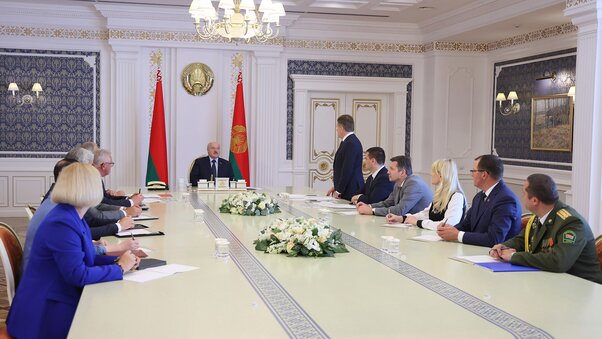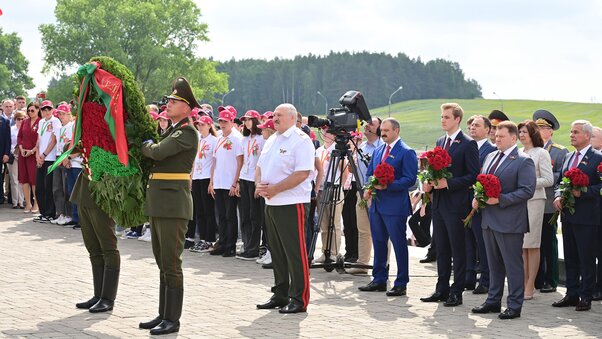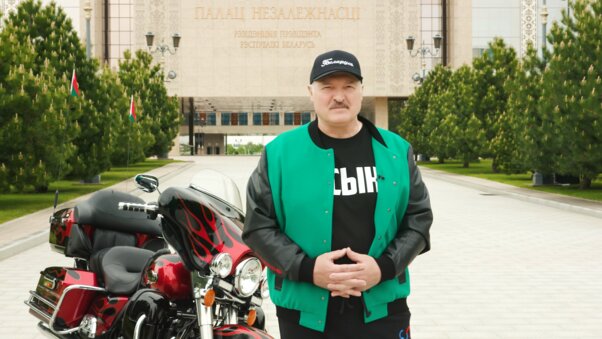Open lesson “Historical memory - the road to the future”
- 28
- 3
Belarus President Aleksandr Lukashenko hosted the open lesson “Historical memory - the road to the future” on 1 September.
When asked about roots of the Belarusian nation, Aleksandr Lukashenko said he had been encouraged to talk about it by recent statements of the German chancellor, who had allegedly discussed Belarus' statehood and sovereignty with the Russian President.
Aleksandr Lukashenko said: “As we open the Constitution, we have to understand that our roots are very ancient. Nobody can criticize us from this angle. Our ancestors established the Principality of Polotsk as early as the tenth century. This sacred land is the cradle of Belarusian statehood. Polotsk was one of the three key centers of Ancient Rus alongside Novgorod and Kiev. Other principalities were established later on. A local dynasty ruled the Principality of Polotsk for a long period of time while other lands were ruled by Kiev appointees. In other words, the source of our statehood was already independent.”
The Belarus President also mentioned the Principality of Turov, which was another ancient state in Belarusian lands. Aleksandr Lukashenko said that this principality had political connections with the Kievan Rus but enjoyed a special status. He said that the Kievan Rus greatly appreciated the Principality of Turov because it was ruled by future heirs to the Kiev throne. The President reminded that the Principality of Turov was a spiritual, cultural, and enlightenment center in southern Belarus. “You've studied the biography of Kirill of Turov. He was an outstanding Eastern Slavic enlightener and a silver-tongued orator. His teachings were known far and wide in Slavonic lands and beyond the Ancient Rus.”
He remarked that Belarusians also take pride in the fact that the great woman Euphrosyne of Polotsk was one of them. She was Belarus' first saint, an enlightener and a politician. She had the right to personally sign documents and had a seal of her own. “Do you know many women of that age, who could enjoy diplomatic correspondence with men in positions of power? Her opinion had weight. And most importantly, she dedicated her life to a great mission: the establishment of peace in Eastern Slavic lands, which were mired in feuds,” Aleksandr Lukashenko reminded.
In this mission lies the root of Belarusian pacifism and good-neighborly relations, which are part of the nation's mentality and determine the policy of modern Belarus, Aleksandr Lukashenko stressed.
Speaking about Christian values and Slavonic brotherhood, Aleksandr Lukashenko remarked that the 10-13th centuries were very complicated times. A struggle for power and money was in progress in the Ancient Rus at the time and hostile Western forces tried to exploit this domestic disagreement. “Under a specious excuse of bringing Christian values. Bringing how? The way they can do it now – by fire and sword. What helped our ancestors survive in this most complicated geopolitical situation? Slavonic brotherhood, unity. A clear understanding of who the enemy was and who the brother was,” the head of state said.
Aleksandr Lukashenko reminded that in the face of an external threat Slavonic nations could forget grievances, stop quarrels, and stand up shoulder to shoulder to protect their common home. This is how the Grand Duchy of Lithuania, Rus, and Samogitia was born.
The President also noted that who oversaw the establishment of the grand duchy is now hotly debated. Aleksandr Lukashenko had previously stated that Lithuanians had privatized the legacy of this great state. Now he suggested finding out what things Lithuanian the state had. “The language was ours. The same language was used to write the constitution. Orthodox Christianity was the dominant religion. The territory included Belarusian, Ukrainian, and partially Russian lands. The Belarusian lands and the Belarusian ethnos were state-constituting. The people were ours by more than 80%. Those were Slavs. And all of it – the territory, the people, the language, the cultural traditions – are the main attributes of statehood. There is no sovereignty without these attributes. Of our Belarusian statehood. It was in this period that Belarusian ethnos was born,” Aleksandr Lukashenko pointed out.
The head of state remarked that while Roman law was dominant in Western Europe, ancient Belarusians lived according to their own laws and did not chase after European fashions. And Lithuanians did not have a written language at all back then. “Who conquered whom after all? We were masters in our own land,” Aleksandr Lukashenko stressed.
During the open lesson the President reminded about a heroic deed committed by the forefathers. In his words, Slavonic unity helped stop German aggression for over 500 years. Regiments from Orsha, Mstislavl, and Smolensk demonstrated particular tenacity and courage in the Battle of Grunewald. “The Polish historian Jan Dlugosz wrote about it. He wrote about it right after the battle by historical standards, only decades later,” Aleksandr Lukashenko remarked.
The President stated this heroic deed of ancient Belarusians has yet to be worthily evaluated. “And I am convinced that our historians (maybe you after getting the relevant education) will do it,” he said.
History became more interesting later on, Aleksandr Lukashenko remarked. Those, who were allied with Belarusians during the Battle of Grunewald, betrayed them. During the Livonian War the ruling elite of the Kingdom of Poland set the Grand Duchy of Lithuania and the Tsardom of Russia at odds with each other.
“Poland captured Ukrainian lands and forced the Grand Duchy of Lithuania to sign the Union of Lublin. They wanted our land even back then. This idea still excites Polish elites,” Aleksandr Lukashenko is convinced.
Commenting on the creation of the Polish-Lithuanian Commonwealth (Rzeczpospolita), Aleksandr Lukashenko remarked it was founded through treachery. “Riddle me this: is it possible to create a solid state based on deceit, treachery, cunning, and oppression of nations? Certainly not,” the President said.
But the Polish-Lithuanian Commonwealth was created in this manner. According to Aleksandr Lukashenko, it represents a vivid example of how a union state should not be established. “You must not take away language, culture, and faith from an allied nation. You cannot demean its dignity. But it happened in the Polish-Lithuanian Commonwealth. What does a state rely on? Its people. And what can it rely on when part of the nation is destroyed and the society suffers from a spiritual and cultural split?” the head of state wondered.
Aleksandr Lukashenko pointed out that with this domestic policy the Polish-Lithuanian Commonwealth could not be a strong state and fell. “They ended it the way they started it: by parceling out the lands among neighbors,” he said.
During the open lesson the President also mentioned what the Russian Empire had given to Belarusians. Aleksandr Lukashenko stated local and foreign Russophobes had put a lot of effort into besmirching that period of time. But from an objective point of view Belarusians established a nation as part of the Russian Empire, the President said.
“Our ancestors were part of the triune state-constituting nation of the empire: Great Russians, Belarusians, and Little Russians. In other words, Russians, Belarusians, and Ukrainians. Our nation would have fallen if the Polish-Lithuanian Commonwealth had not been split apart. We would have called ourselves Orthodox Poles at best just like tens of thousands of residents of modern Bialystok Voivodeship call themselves today,” Aleksandr Lukashenko pointed out. “The Russian Empire was our country, too. We knew we lived in our own land and we fought for it in 1812 against European troops united by Napoleon.”
Yet the President admitted that Belarusians faced a lot of disadvantages in the Russian Empire. Aleksandr Lukashenko remarked that back then Europe traditionally professed its values: mythical freedom, equality, and brotherhood. “Once again by sword and cunning, by toying with polonized gentry's dreams of restoring a Polish state. But our ancestors did not fight for the Polish-Lithuanian Commonwealth. They fought for their Fatherland together with the Russian army. And that war was a patriotic one for us and for Russians whatever liberal pro-Western historians may say,” the President stressed.
Aleksandr Lukashenko also mentioned oppression practiced by Polish gentry and the Belarusian People's Republic – a state on paper. “World War One. Once again against the West. Revolutionary shocks, occupation, and economic disasters were added to the war. What about our neighbors represented by Polish elites? They started a Polish-Soviet war with the same idea: to grab a slice of our lands. And they nearly succeeded,” he noted.
Aleksandr Lukashenko reminded that the Belarusian nation was split apart by the Peace of Riga for virtually 20 years: “Our ancestors in Western Belarus once again felt whips of Polish gentry: polonization, confessional, and social and economic oppression.” “It is surprising we've managed to survive in that turmoil. Moreover, we started building our national statehood. And I'd like to remark: on the Soviet foundation instead of under the boot of the Kaiser as individual figures of the Belarusian People's Republic attempted to. The Belarusian People's Republic existed on paper only,” the President noted.


